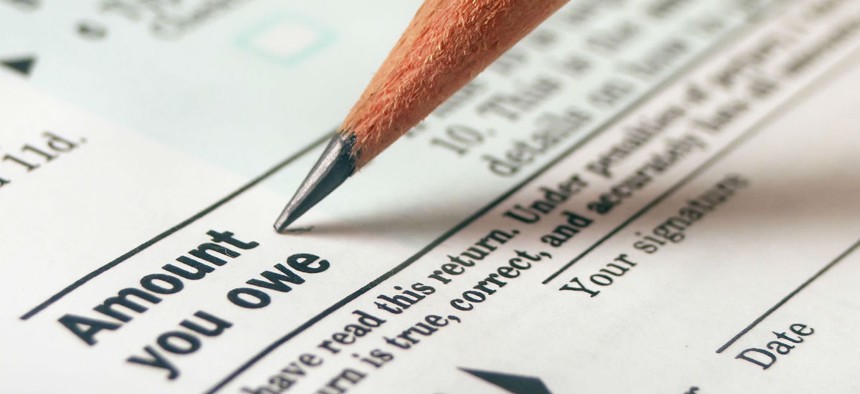IRS Revs Up Mandated Private Tax-Debt Collection
Agency hopes to avoid past problems through improved contractor communications.
With hopes of shaving off some of the estimated $458 billion in taxes that go uncollected, the Internal Revenue Service on Tuesday announced the launch of its congressionally required program to farm out efforts to collect long-standing tax debts owed the government.
The controversial approach—which union critics warn has failed when tried by the Clinton and George W. Bush administrations—will start small and protect innocent taxpayers, agency officials said.
“The IRS is taking steps throughout this effort to ensure that the private collection firms work responsibly and respect taxpayer rights,” said IRS Commissioner John Koskinen in a statement. “The IRS also urges taxpayers to be on the lookout for scammers who might use this program as a cover to trick people. In reality, those taxpayers whose accounts are assigned as part of the private collection effort know they have a tax debt.”
The four contractors, all experienced with federal agencies and incentivized by commissions, are CBE Group of Cedar Falls, Iowa; Conserve of Fairport, N.Y.; Performant of Livermore, Calif.; and Pioneer of Horseheads, N.Y. Each is now being assigned about 100 accounts for recalcitrant taxpayers a week, a workload of 400 per week that will grow to several thousand per week by the end of the summer, according to Mary Beth Murphy, commissioner of the IRS Small Business and Self-Employed Division, who spoke to reporters.
All the taxpayers being targeted “have been contacted by the IRS multiple times,” Murphy said, “and no one will hear from the [private collectors] unless they have unpaid taxes—so if you know you are current on your taxes, and get a call, that’s a sure sign of a scam.” As a further tool to assure legitimacy, the taxpayers in question will first receive written notification of the arrangement from the IRS before they hear directly from the private firms.
The initial debts targeted are under $50,000, said Bill Banowski, lead executive on the private debt collection program. “We learned from [the past efforts at private collection] to be sure that the taxpayer has confidence they’re talking to the right person,” he said. “It’s important for IRS to share information with the firms—the last time there was a lot of back and forth.”
The IRS will “measure costs and the firms’ ability to resolve accounts and promote compliance,” reporting biannually to Congress, Banowski added. Lawmakers appropriated no new funds for the program, so “the costs are absorbed by the IRS,” he said, though “the law allows us to keep a portion of the retained earnings and hire a special compliance person.”
In crafting the program and its future evaluation, the IRS worked with skeptics at the National Treasury Employees Union and the office of the National Taxpayer Advocate, Murphy said. The private firm’s employees will identify themselves as contractors of the IRS, they must follow the Fair Debt Collection Practices Act, and they “must be courteous and must respect taxpayer rights,” the agency said. Private firms are not authorized to take enforcement actions, such as filing a notice of Federal Tax Lien or issuing a levy.
The National Treasury Employees Union on Tuesday called the announcement “an unwelcome development that will waste taxpayer money and further endanger taxpayers who are already targeted by financial scams and identity thieves.”
“Every time this has been tried before, it has failed,” said NTEU National President Tony Reardon. “But once again Congress has forced this policy on the IRS, and we expect the results to be the same: collection agents getting paid to harass taxpayers, many of whom need assistance, not threats.”
NTEU also questioned how much money the IRS has already spent re-starting this program, including reviewing the bids from the contractors and setting up the process for monitoring their work. “Unlike private debt collectors, IRS employees have a variety of tools at their disposal with which they can help taxpayers facing financial difficulties meet their tax obligations,” the union said.
To avoid getting scammed, Murphy stressed, taxpayers should know that the IRS “never phones and threatens to send the police or arrest a taxpayer,” a prohibition the contractors will adhere to. Nor does IRS offer delinquent taxpayers a chance to make payments using iTunes cards or gift cards, she said. Payment checks should always be made out to the U.S. Treasury and sent nowhere but to the IRS. She encouraged those who know they’re behind on their taxes to come forward (it’s easy online, she said) to negotiate a payment plan or, in some cases, a discounted “offer in compromise.”
“We have great confidence in this team,” Murphy said. “Congress wants both the companies and the government to succeed in this.”
CORRECTION: The original version of this story misstated the value of the initial debts collected.
NEXT STORY: Jeff Sessions Decides Not to Police the Police








